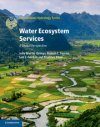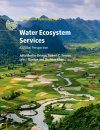About this book
This comprehensive volume describes how ecosystem services-based approaches can assist in addressing major global and regional water challenges, such as climate change, biodiversity loss, and water security in the developing world, by integrating scientific knowledge from different disciplines, such as hydrological modelling, environmental economics, psychology and international law. Empirical assessments at the national, catchment and regional levels are used to critically appraise this systemic approach, and the merits and potential limitations are presented. The practicalities of this approach with regard to water resources management, nature conservation, and sustainable business practices are discussed, and the role of society in underpinning the concept of ecosystem services is explored. Presenting new insights and perspectives on how to shape future strategies, this contributory volume is a valuable reference for researchers, academics, students and policy makers, in environmental studies, hydrology, water resource management, ecology, environmental law, policy and economics, and conservation biology.
Contents
Preface
1. Introduction Iain J. Gordon, Julia Martin-Ortega and Robert C. Ferrier
2. What defines ecosystem services-based approaches? Julia Martin-Ortega, Dídac Jordà Capdevila, Klaus Glenk and Kirsty L. Holstead
Part I. Addressing Global Challenges:
3. Assessing climate change risks and prioritising adaptation options using a water ecosystem services-based approach Samantha J. Capon and Stuart E. Bunn
4. Operationalizing an ecosystem services-based approach for managing river biodiversity Catherine M. Febria, Benjamin J. Koch and Margaret A. Palmer
5. Water for agriculture and energy: the African quest under the lenses of an ecosystem services-based approach Maher Salman and Alba Martinez
Part II. Applying Frameworks for Water Management and Conservation under an Ecosystem Services-Based Approach:
6. Using ecosystem services-based approaches in integrated water resources management: perspectives from the developing world Madiodio Niasse and Jan Cherlet
7. Implementation of the European Water Framework Directive: what does taking an ecosystem services-based approach add? Kirsty L. Blackstock, Julia Martin-Ortega and Chris J. Spray
8. How useful to biodiversity conservation are ecosystem services-based approaches? Craig Leisher
Part III. Assessing Ecosystem Services:
9. The first United Kingdom's National Ecosystem Assessment and beyond Marije Schaafsma, Silvia Ferrini, Amii R. Harwood and Ian J. Bateman
10. Using an ecosystem services-based approach to measure the benefits of reducing diversions of freshwater: a case study in the Murray-Darling basin, Australia Neville D. Crossman, Rosalind H. Bark, Matthew J. Colloff, Darla Hatton MacDonald and Carmel A. Pollino
11. An ecosystem services-based approach to integrated regional catchment management: the South East Queensland experience Simone Maynard, David James, Stuart Hoverman, Andrew Davidson and Shannon Mooney
12. Policy support systems for the development of benefit sharing mechanisms for water related ecosystem services Mark Mulligan, Silvia Benitez, Juan Sebastian Lozano and Jorge Leon
13. Assessing biophysical and economic dimensions of societal value: an example for water ecosystem services in Madagascar Ferdinando Villa, Rosimeiry Portela, Laura Onofri, Paulo A. L. D. Nunes and Glenn-Marie Lange
14. Rapid land use change impacts on coastal ecosystem services: a South Korean case study Hojeong Kang, Heejun Chang and Min Gon Chung
Part IV. Broadening the Perspective:
15. Ecosystem services-based approaches to water management: what opportunities and challenges for business? Joël Houdet, Andrew Johnstone and Charles Germaneau
16. Key factors for successful application of ecosystem services-based approaches to water resources management: the role of stakeholder participation Jos Brils, Albert F. Appleton, Nicolaas van Everdingen and Dylan Bright
17. Cultural ecosystem services, water and aquatic environments Andrew Church, Rob Fish, Neil Ravenscroft and Lee Stapleton
18. The psychological dimension of water ecosystem services Victor Corral-Verdugo, Martha Frías-Armenta, César Tapia-Fonllem and Blanca Fraijo-Sing
19. The interface between human rights and ecosystem services Stephen J. Turner
20. Water ecosystem services: moving forward Julia Martin-Ortega, Robert C. Ferrier and Iain J. Gordon
Customer Reviews
Biography
Dr Julia Martin-Ortega is Senior Environmental Economist at The James Hutton Institute, Scotland. She has an interdisciplinary background in environmental sciences and economics, with an emphasis on environmental valuation and an increased interest in participatory approaches. Her research, focusing on the understanding of the relationships between people and water ecosystem services, has informed policy-making in relation to issues such as the implementation of the European Water Framework Directive and the development of the Water Resources (Scotland) Act.
Professor Robert C. Ferrier is the Director of Research Impact at the James Hutton Institute, Scotland. His extensive research interests centre on the role of policy and land use change on water resources and the development of systems based approaches for sustainable management. He has 30 years' experience in water resources management, particularly the hydrological, hydrochemical and ecological consequences of environmental change, in both freshwater and coastal systems. He is also Director of the Centre of Expertise for Waters (CREW) and is involved in delivering the Scottish Government's Hydro Nation agenda, both domestically and internationally.
Professor Iain J. Gordon is the Chief Executive and Director of the James Hutton Institute, Scotland. He has played an active role in promoting the value of biodiversity and its importance in the provision of ecosystem services and human wellbeing, and has managed projects in Africa, Asia, South America and Australia including major research portfolios on land management to improve the water quality of the catchments flowing into the lagoon of the Great Barrier Reef.
Professor Shahbaz Khan is Deputy Director of Asia and the Pacific Regional Science Bureau of UNESCO where he advises UN member states on environmental policies, review of curricula, and securing multilateral support for research and education projects especially in the Asia-Pacific and African regions. He has been involved in a range of innovative water management programs through his work with the Australian government. Professor Khan was previously Chief of Water and Sustainable Development at UNESCO, Paris, and prior to this, was Professor of Hydrology and Director of the International Centre of Water at the Charles Sturt University, Australia.
Contributors:
- Iain J. Gordon
- Julia Martin-Ortega
- Robert C. Ferrier
- Dídac Jordà Capdevila
- Klaus Glenk
- Kirsty L. Holstead
- Samantha J. Capon
- Stuart E. Bunn
- Catherine M. Febria
- Benjamin J. Koch
- Margaret A. Palmer
- Maher Salman
- Alba Martinez
- Madiodio Niasse
- Jan Cherlet
- Kirsty L. Blackstock
- Chris J. Spray
- Craig Leisher
- Marije Schaafsma
- Silvia Ferrini
- Amii R. Harwood
- Ian J. Bateman
- Neville D. Crossman
- Rosalind H. Bark
- Matthew J. Colloff
- Darla Hatton MacDonald
- Carmel A. Pollino
- Simone Maynard
- David James
- Stuart Hoverman
- Andrew Davidson
- Shannon Mooney
- Mark Mulligan
- Silvia Benitez
- Juan Sebastian Lozano
- Jorge Leon
- Ferdinando Villa
- Rosimeiry Portela
- Laura Onofri
- Paulo A. L. D. Nunes
- Glenn-Marie Lange
- Hojeong Kang
- Heejun Chang
- Min Gon Chung
- Joël Houdet
- Andrew Johnstone
- Charles Germaneau
- Jos Brils
- Albert F. Appleton
- Nicolaas van Everdingen
- Dylan Bright
- Andrew Church
- Rob Fish
- Neil Ravenscroft
- Lee Stapleton
- Victor Corral-Verdugo
- Martha Frías-Armenta
- César Tapia-Fonllem
- Blanca Fraijo-Sing
- Stephen J. Turner







































